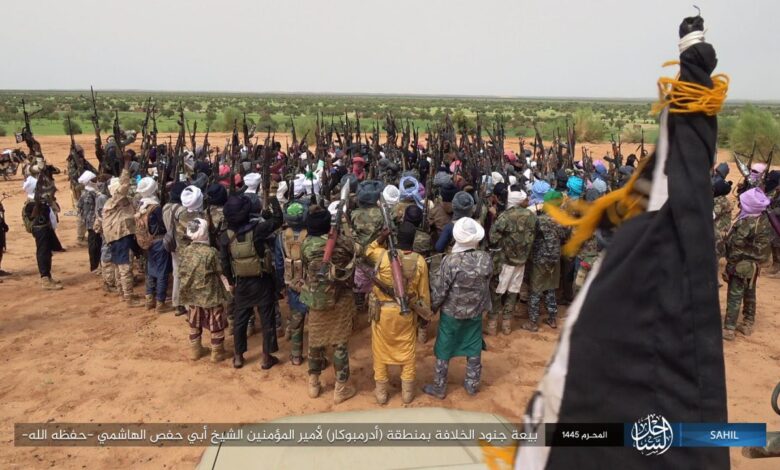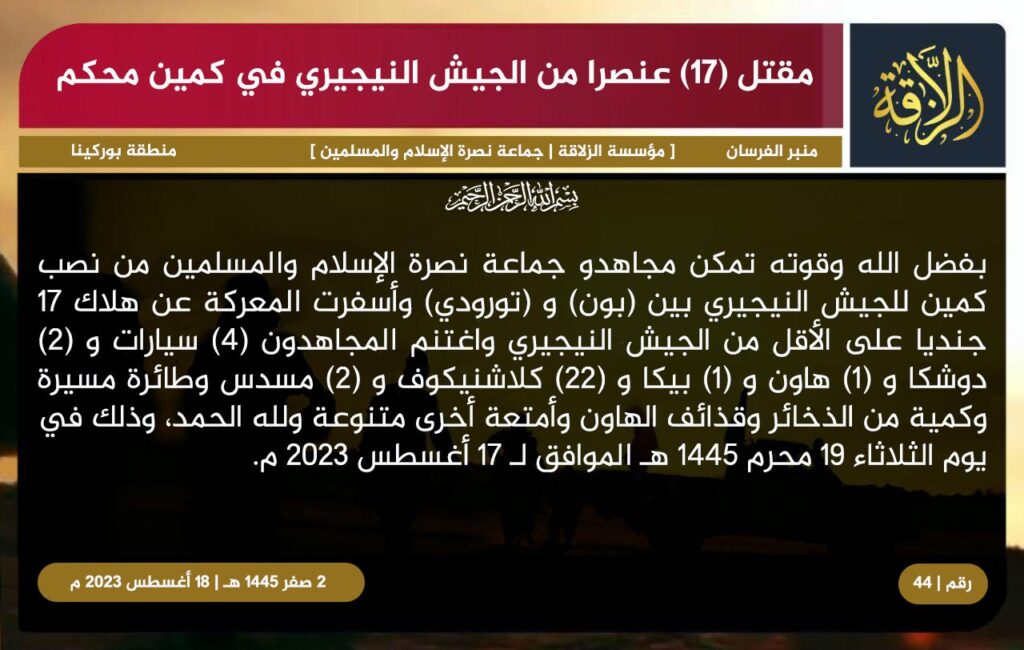Jihadist Groups Remain Active In Niger Republic Despite New Military Leadership
The junta in Niger claimed deteriorating security was a justification for their taking over, but attacks by jihadist groups affiliated with both Al-Qaeda and the Islamic State on civilians and military targets have continued since the military takeover.

Following the recent military junta’s seizure of power and the removal of President Mohamed Bazoum in the Niger Republic, the country’s battle against jihadist insurgency has suffered a setback, attacks on military and civilian targets have continued.
Despite the military’s assertions of worsening security as a key rationale for their intervention, the persistent and intricate predicament presented by jihadist factions linked to both Al-Qaeda and the Islamic State continues to demand urgent attention.
Niger finds itself grappling with a complex and multifaceted security situation. In the vast expanse of the western region, a formidable Sahelian insurgency has taken center stage, with ISGS, the Islamic State in the Greater Sahara (now integrated into Islamic State West Africa Province) and the al-Qaeda-linked Jama’atu Nusratul Islam Wal Muslimin (JNIM) at the helm.
This insurgency combined with cases of banditry has given rise to a highly precarious conflict zone, nestled within the borders of Nigeria, Mali, and Burkina Faso.
In the southeastern region of Diffa, a complex security situation unfolds as the presence of two extremist groups, ISWAP and Boko Haram (Jama’atu Ahlussunnah Liddaawati Wal Jihad), poses significant challenges.
These groups’ activities frequently extend beyond the borders of neighboring territories, further exacerbating the situation in the border communities.
Border tension
The Diffa region continues to face a persistent threat of cross-border attacks especially with the deteriorating diplomatic ties between Nigeria and Niger which has negatively affected counter-terrorism efforts in the borders.
The closure of the Nigeria/Niger border has made it difficult for troops from the two countries to operate in the border communities for successful operations in a region hosting thousands of Nigerian refugees.
In the central Tahoua region, a multifaceted combination of IS Sahel militancy and widespread banditry poses a significant challenge. In the Sahel region, the delicate governance structure has inadvertently created a breeding ground for the spread of violent extremism.
Recently after the coup in Niger, jihadist groups have released propaganda materials that shed light on their ongoing activities within the borders of the country. These releases serve as a reminder of the persistent presence and actions of these extremist organizations in the region.
JNIM has claimed responsibility for an attack that killed “at least seventeen soldiers” on August 17, 2023, in the region between Boni and Torodi. The terrorists successfully made off with a cache of military equipment, which notably included vehicles and firearms.

The Islamic State West Africa Province (ISWAP) has also come forward to claim responsibility for two separate attacks in its 403rd issue of Al-Naba. The first incident occurred on August 8, when ISWAP declared their involvement in an attack on Nigerien forces which killed three of them.
This was followed by a dual-pronged attack on August 22, targeting both civilians and the military in the Tillaberi Region in which casualties are yet to be specified. This declaration sheds light on their increasing presence and bold actions in the region even under the military junta.
What lies in the future?
Amid mounting international pressure, particularly from the Economic Community of West African States (Ecowas), the military junta in Niger Republic stands firm in its stance on unwillingness to restore the ousted civilian rule of President Bazoum. They have said they will begin a process of handing back to a civilian government in three years’ time.
On its part, Ecowas has disregarded the three-year timeframe cited by them for the transition back to democratic governance vowing to take military action if the junta persists in their refusal to relinquish power and restore leadership to the nation.
According to sources within the bloc, preparations for the highly anticipated invasion of Niger have been completed, with the operation’s commencement eagerly awaiting a final command. In a show of solidarity, Mali and Burkina Faso have thrown their support behind Niger.
The intervention by Ecowas is expected to further exacerbate the already dire situation in Niger. Jihadist groups are always quick to exploit security loopholes, to launch attacks in a manner similar to the situations witnessed in neighboring Mali and Burkina Faso where military take over didn’t successfully address jihadi insurgency.
In the face of ongoing tension, security analysts maintain a skeptical outlook on the military junta’s capacity to adequately tackle the pressing challenges confronting the nation.
In the ever-changing landscape of the jihadist insurgency, characterized by its unpredictable nature, the junta is expected to face challenges in facing the terrorists, especially with limited foreign aid and deteriorating neighboring collaboration with Nigeria.
Amidst the assertions and endeavors of the military junta, doubts persist regarding their ability to suppress the persistent menace, prompting a wider examination of the effectiveness of military interventions in tackling intricate security challenges.
Under the leadership of President Bazoum, there had been notable progress in addressing the security challenges faced by the nation. This progress is evident in the significant reduction of attacks, which saw a 39 per cent decrease during the first six months of 2023.
However, the recent military takeover poses a potential threat to the gains achieved thus far. The history of instability in Niger Republic is said to be worsened by a long-standing pattern of frequent political transitions facilitated by military coups.
The success achieved under Bazoum is partially attributed to his leadership’s approach of engaging in dialogue with certain extremists and implementing deradicalization efforts.
This strategic combination, coupled with effective military tactics, has yielded positive results. Notably, the management of Tuareg rebellions in the country has served as a precedent for this approach, further enhancing its efficacy.
Although the current junta has yet to fully establish its authority, there are concerns that the situation in Niger will not be different from what has been witnessed in neighboring Mali and Burkina Faso. In both these countries, juntas have struggled to effectively tackle the escalating violence perpetrated by jihadist groups.
Support Our Journalism
There are millions of ordinary people affected by conflict in Africa whose stories are missing in the mainstream media. HumAngle is determined to tell those challenging and under-reported stories, hoping that the people impacted by these conflicts will find the safety and security they deserve.
To ensure that we continue to provide public service coverage, we have a small favour to ask you. We want you to be part of our journalistic endeavour by contributing a token to us.
Your donation will further promote a robust, free, and independent media.
Donate HereStay Closer To The Stories That Matter




